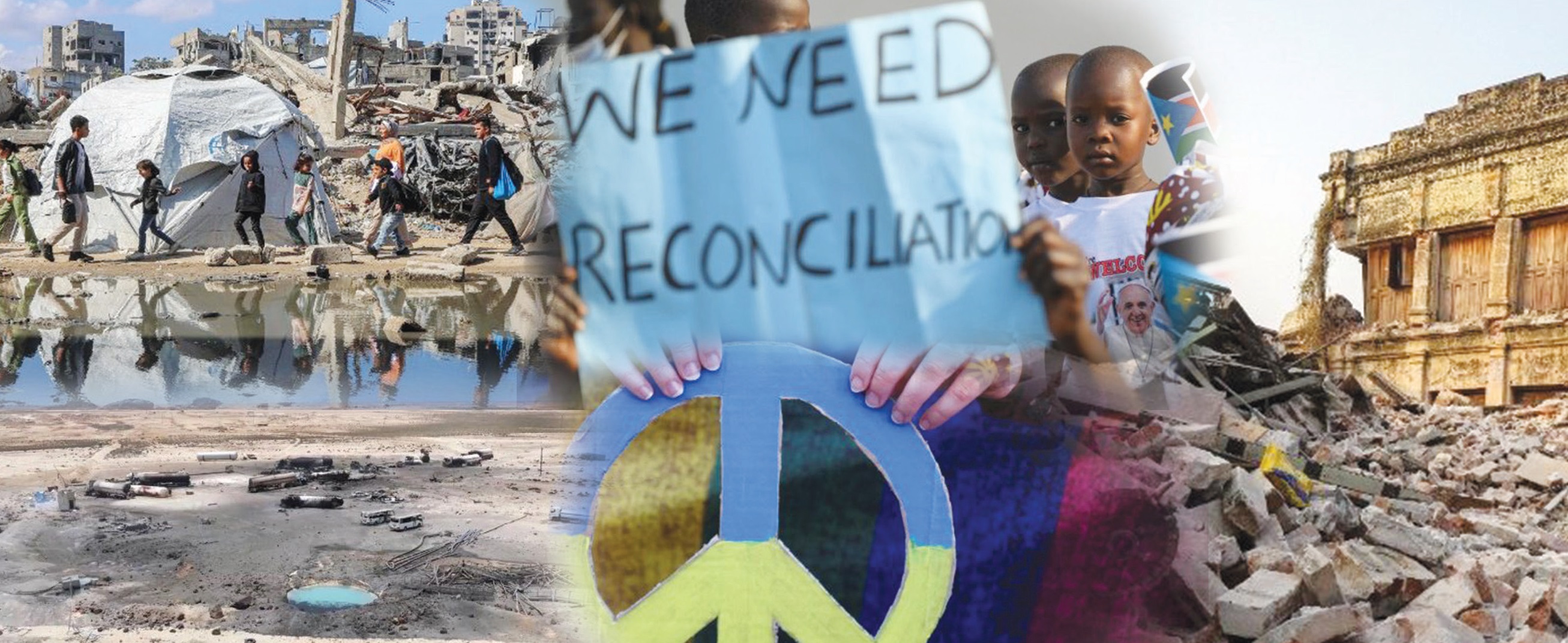Christ is Risen!
On Easter Sunday (April 20), Pope Francis addressed a world in crisis with a message of peace and urgency. From St Peter’s Basilica, the 88-year-old pontiff delivered his Urbi et Orbi blessing, calling for an end to war, hunger, and division.
Apr 25, 2025

VATICAN: On Easter Sunday (April 20), Pope Francis addressed a world in crisis with a message of peace and urgency. From St Peter’s Basilica, the 88-year-old pontiff delivered his Urbi et Orbi blessing, calling for an end to war, hunger, and division.
Still recovering from pneumonia, he entrusted the reading of his address to Archbishop Diego Ravelli, but his presence and message were as forceful as ever: “Christ is risen — and hope must rise with Him”.
As his words resonated throughout the square, he reflected on the Resurrection not as a distant, abstract belief, but as a force that “challenges, heals, and empowers,” reminding the faithful that “hope does not disappoint.” He declared that “love has triumphed over hatred, light over darkness, and truth over falsehood. Forgiveness has triumphed over revenge.”
But even on this joyful day, the Pope’s attention remained with the suffering. His message was not only a proclamation of Christian hope but a moral call to the world.
Pope Francis lamented the many wars and humanitarian disasters ravaging the planet.
“Evil has not disappeared from history,” he said, “but it no longer has the upper hand over those who accept the grace of this day.”
He began with a passionate plea for peace in the Holy Land, condemning the ongoing violence in Gaza, where “the terrible conflict continues to cause death and destruction and to create a dramatic and deplorable humanitarian situation.” He called for “an immediate ceasefire in the Gaza Strip,” the release of hostages, and full access to humanitarian aid.
He extended his solidarity to Christians in Palestine and Israel, to all those suffering in Lebanon and Syria, and to the victims of war in Yemen, urging all parties to seek resolution “through constructive dialogue.”
His voice also reached Ukraine, calling for efforts toward a “just and lasting peace,” and to the South Caucasus, praying for reconciliation between Armenia and Azerbaijan. He appealed to leaders in the Western Balkans to abandon destabilising actions and seek harmony.
The Pope turned his focus to Africa, praying for peace in the Democratic Republic of the Congo, Sudan, South Sudan, the Sahel, the Horn of Africa, and the Great Lakes region. “In the face of the cruelty of conflicts that involve defenceless civilians and attack schools, hospitals and humanitarian workers, we cannot allow ourselves to forget that it is not targets that are struck, but persons, each possessed of a soul and human dignity.”
He prayed for Christians across the continent unable to live their faith freely, reaffirming that “there can be no peace without freedom of religion, freedom of thought, freedom of expression, and respect for the views of others.”
Speaking of Myanmar, Pope Francis expressed sorrow for the victims of recent violence and a devastating earthquake in Sagaing, and he welcomed the news of a potential ceasefire as “a sign of hope for the whole of Myanmar.” 
The Pope issued a stern warning against the global “logic of fear,” which he said leads to isolation, division, and a dangerous race toward rearmament. “Let us not use our resources for weapons that sow death,” he urged, “but for food, development, and care for one another.” These, he said, are the real “weapons of peace.”
He decried the “growing climate of anti- Semitism” across the world and renewed his commitment to interfaith solidarity, especially in the Middle East.
In this Jubilee Year, the Pope asked that Easter be an occasion for “the liberation of prisoners of war and political prisoners,” and called for the international community to act in accordance with the “principle of humanity.” He reminded listeners that “peace is impossible without true disarmament” and called for the dismantling of the “barriers that divide us — physical, political, economic, and spiritual.”
This Easter carried special meaning, coinciding with the 1700th anniversary of the Council of Nicaea and celebrated jointly by Catholic and Orthodox Christians. After the blessing, Pope Francis toured the square in the popemobile — his first such public movement since hospitalisation — waving to pilgrims who responded with shouts of joy.
“Let us entrust ourselves to Him,” Pope Francis concluded, “for He alone can make all things new.” His Easter message, filled with both sorrow and hope, challenged the world not to be passive in the face of injustice, but to be empowered by the hope of the Resurrection — a hope, he insisted, that “does not delude, but empowers us.” --Agencies







Total Comments:0